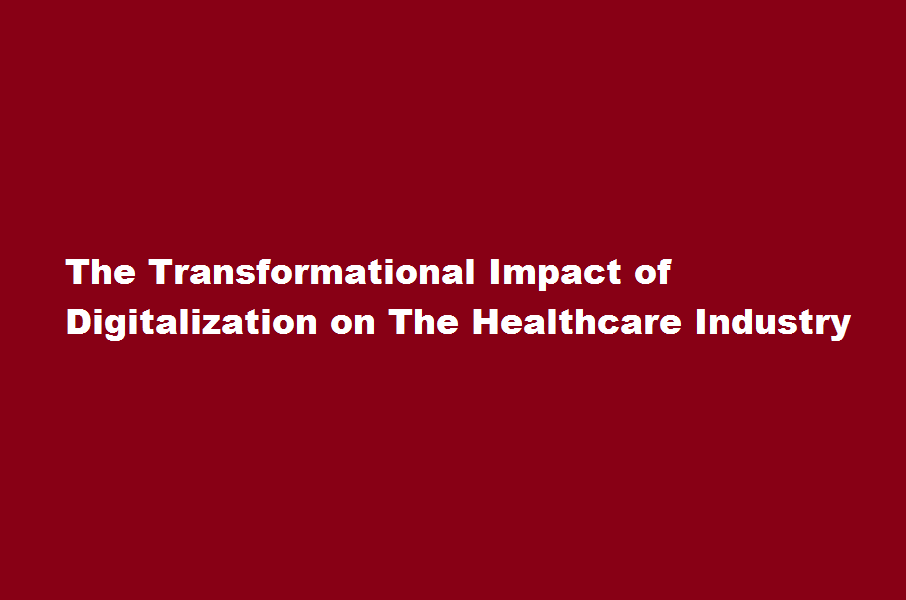The Transformational Impact of Digitalization on The Healthcare Industry
4 min read
Introduction
Digitalization has brought about a significant revolution in various sectors, and the healthcare industry is no exception. With the integration of digital technologies, healthcare has transformed into a more patient-centric, efficient, and data-driven field. This article explores the profound impact of digitalization on the healthcare industry, highlighting how it has changed the way patients receive care, healthcare providers deliver services, and researchers conduct studies.
Enhanced Patient Access and Telemedicine
Digitalization has expanded patient access to healthcare services, particularly through telemedicine. Patients can now consult with healthcare professionals remotely, saving time, and eliminating geographical barriers. Telemedicine enables patients to receive medical advice, prescriptions, and even follow-up care from the comfort of their homes. Digital platforms and mobile health apps provide convenient and secure channels for communication between patients and healthcare providers, enhancing accessibility and improving patient outcomes.
Electronic Health Records and Data Management
Digitalization has revolutionized the way patient information is stored and managed. Electronic Health Records (EHRs) have replaced paper-based records, providing a secure and centralized platform for healthcare providers to access and share patient data. EHRs improve care coordination, reduce medical errors, and enable better collaboration among healthcare teams. Furthermore, data analytics and artificial intelligence (AI) algorithms can extract valuable insights from large datasets, facilitating personalized treatment plans, predictive analytics, and population health management.
Telemonitoring and Remote Patient Monitoring
Digitalization has enabled remote patient monitoring and telemonitoring, transforming the management of chronic conditions and post-acute care. Connected devices and wearable sensors can collect real-time patient data, such as vital signs, glucose levels, and activity levels, and transmit it to healthcare providers for analysis. This continuous monitoring helps detect early warning signs, facilitates timely interventions, and reduces hospital readmissions. Patients can actively participate in their own care, leading to improved health outcomes and quality of life.
Digital Imaging and Diagnostics
Digitalization has revolutionized medical imaging and diagnostics. Digital imaging technologies, such as Magnetic Resonance Imaging (MRI), Computed Tomography (CT), and Ultrasound, offer higher resolution, faster image processing, and easier data sharing compared to traditional film-based systems. Digital images can be stored, accessed, and shared remotely, allowing for quick and accurate diagnoses, virtual consultations, and second opinions. AI algorithms can analyze medical images, assisting radiologists in detecting abnormalities and enhancing diagnostic accuracy.
Precision Medicine and Personalized Healthcare
Digitalization has paved the way for precision medicine and personalized healthcare. With advancements in genomics, proteomics, and bioinformatics, healthcare providers can analyze an individual’s genetic makeup and molecular data to tailor treatments based on their unique characteristics. Digital platforms enable the integration of genomic data with clinical records, facilitating personalized treatment plans, targeted therapies, and improved medication management. This shift towards personalized medicine holds the potential to revolutionize disease prevention, diagnosis, and treatment outcomes.
Health Information Exchange and Interoperability
Digitalization has promoted health information exchange and interoperability among healthcare systems. Interconnected EHR systems and standardized data formats facilitate the seamless sharing of patient information between healthcare providers, improving care coordination and reducing duplication of tests and procedures. Health information exchange platforms enable healthcare professionals to access critical patient data in real-time, resulting in faster and more informed decision-making.
Frequently Asked Questions
How has digitalization improved patient engagement in healthcare?
Digitalization has improved patient engagement by providing convenient access to healthcare services through telemedicine, enabling patients to actively participate in their care, access their medical records, and receive personalized health information through digital platforms.
How has digitalization improved healthcare efficiency and cost-effectiveness?
Digitalization has improved healthcare efficiency by streamlining workflows, reducing paperwork, enhancing care coordination, and minimizing medical errors. It has also enabled cost-effective solutions such as telemedicine, remote patient monitoring, and predictive analytics, leading to better resource allocation and reduced healthcare costs.
What are the privacy and security concerns associated with digitalization in healthcare?
Privacy and security concerns in healthcare digitalization include protecting patient data from unauthorized access, ensuring secure data transmission, complying with data protection regulations, and safeguarding against cyber threats. Robust security measures, encryption, and adherence to regulatory guidelines are crucial in addressing these concerns.
How has digitalization impacted healthcare research and innovation?
Digitalization has accelerated healthcare research and innovation by facilitating data sharing, collaboration among researchers, and access to large datasets. It has also enabled the development of advanced technologies like AI, genomics, and precision medicine, opening up new avenues for breakthroughs in disease understanding, treatment development, and healthcare delivery.
Conclusion
Digitalization has transformed the healthcare industry, revolutionizing patient care, improving healthcare efficiency, and enabling data-driven decision-making. From enhanced patient access through telemedicine to the use of electronic health records, remote patient monitoring, digital diagnostics, and personalized medicine, digitalization has empowered patients, healthcare providers, and researchers alike. As technology continues to evolve, embracing digitalization in healthcare will be crucial to unlocking further advancements, improving patient outcomes, and shaping the future of healthcare.






